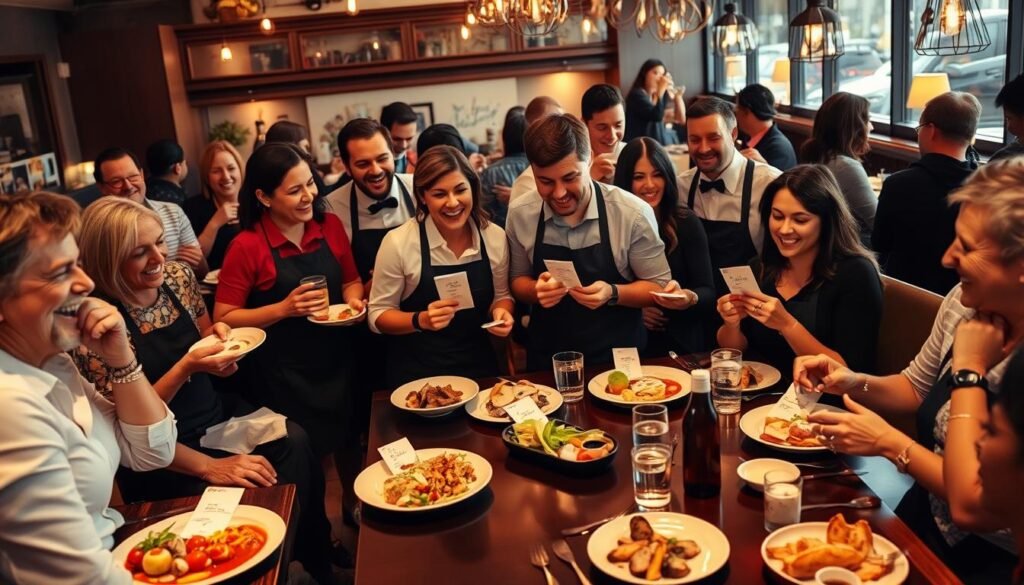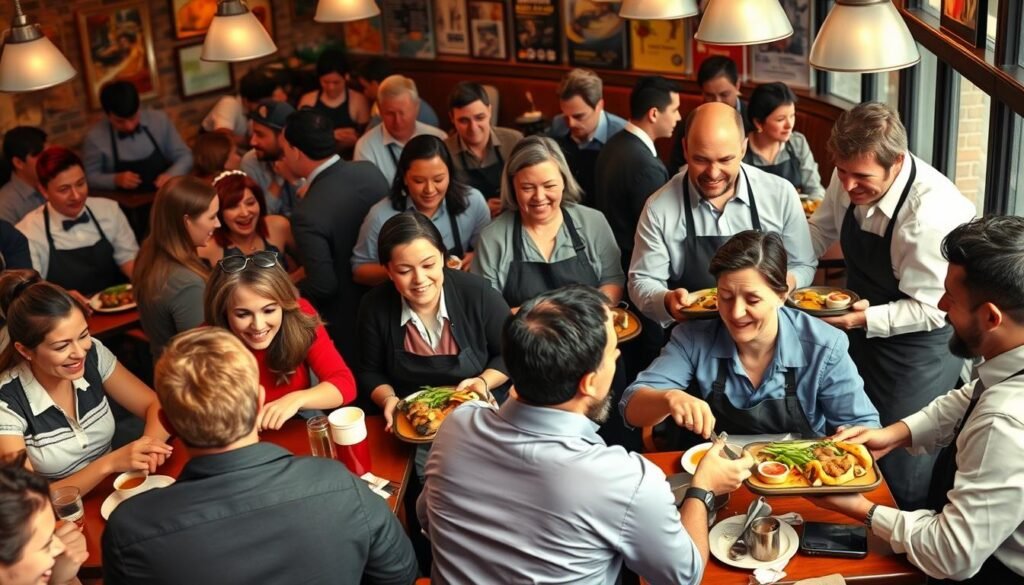Tipping in the U.S. is more than a simple gesture. It holds deep ethical meaning. The phrase “Jesus Tip Your Server” reminds us of this moral responsibility. It tells us to consider how we treat service workers.
In America, tips are a big part of a server’s paycheck. So, the ethical tipping debate is crucial for customers and workers. Thinking about this helps us see how being generous can make eating out better and show our gratitude.
Key Takeaways
- The phrase “Jesus Tip Your Server” highlights the moral duty of diners.
- Tipping serves as a legal form of income for many servers in the U.S.
- Generosity in tipping fosters respect and appreciation for service.
- The ethical tipping debate involves discussions on fairness and equity.
- Understanding tipping practices can enhance the dining experience.
The Importance of Tipping in American Dining Culture
Tipping is key in American dining culture. It shows a strong bond between diners and service staff. This practice started in Europe as a thank-you for good service. When it came to the U.S., it became vital for restaurant workers’ incomes. Tipping is crucial because it helps servers financially. Many rely on this extra money to get by.
Historical Context of Tipping
To understand tipping, we need to know its history. It began in the late 1800s in the U.S., inspired by Europe’s rich dining habits. What started as a sign of wealth turned into a common practice. Today, tipping means gratitude and helps with the low base wages of many workers. Some workers earn less than the minimum wage because they get tips.
Tipping remains important in American dining. Diners often plan to tip as a part of their meal experience. This system connects service quality to tips, pushing servers to do their best. Tipping is not just about money; it’s about fairness and respect. For more on tipping’s ethical side, check this article.
Tipping practices can vary, but they always matter. They show we value service and contributions. This creates a sense of community in dining, showing that kindness matters as much as the food.
Understanding the Concept of Server Gratuity
Server gratuity is vital in the hospitality industry. It is a way to say ‘thank you’ for good service. In the U.S, people usually tip a certain percentage of their total bill.
The normal tip is between 15% to 20%. This shows that quality service can lead to a bigger tip. So, there’s a link between happy customers and the tips they give.
There are different tipping rules for different dining situations. Here is a quick look at common settings and their usual tips:
| Dining Scenario | Typical Gratuity Percentage |
|---|---|
| Casual Restaurants | 15% – 20% |
| Fine Dining | 20% – 25% |
| Takeout Orders | 10% – 15% |
| Delivery Services | 15% – 20% |
Understanding gratuity helps us see its role in dining. It’s not just about service. It also shows how much customers enjoyed their meal. Those who loved their experience may tip more, highlighting great service’s value.
Jesus Tip Your Server: A Call for Generosity
The phrase “Jesus Tip Your Server” means we should show appreciation by tipping well. Being generous makes dining out better for everyone. When customers tip well, they say thank you in a big way to their servers. This makes the restaurant a happier place.
A call for generosity means more than just giving money. It creates a bond between people eating and those serving. Servers feel proud when they get a big tip. This makes them want to do an even better job.
Generous tips have a big impact. They make customers and servers get along better, creating a friendly vibe. Everyone enjoys the meal more. This is good for both sides.
- Creates an encouraging environment for servers.
- Builds rapport between customers and staff.
- Promotes a culture of respect and appreciation.
This way of showing appreciation with bigger tips shows what we value as a society. It proves that being kind makes eating out more fun for all. Following this idea makes us happier together.
Tipping Customs Across Different Cultures
Tipping customs vary greatly around the world. They highlight how different cultures view service and showing thanks. In the United States, tipping is almost a must. People usually leave 15% to 20% of their total bill as a tip. This practice came from how servers get paid, which depends a lot on tips.
In Japan, tipping is usually avoided and can even be seen as rude. The idea is that giving great service is just part of the job, so no tips are needed. In Australia and New Zealand, a service charge is often added to the bill. This makes the tipping process clearer and less confusing.
| Country | Tipping Customs |
|---|---|
| United States | Standard practice is 15%-20% of the bill. |
| Japan | Tipping is not customary and may be considered rude. |
| France | A service charge is included in the bill; rounding up is common. |
| Australia | Tipping is not mandatory, but rounding up is appreciated. |
| Brazil | A 10% tip is often included in the bill. |
Knowing these differences sheds light on global dining etiquette. It shows respect for various cultural norms and practices. Appreciating this diversity improves our own dining experiences worldwide.
Dining Etiquette: When and How Much to Tip
Dining etiquette affects how much we tip service providers. Knowing the right amount shows our appreciation. Tips vary by the type of place we dine in.
In casual dining spots, aim to tip 15% to 20% of your bill. This depends on how well you were served. If the service is outstanding, tipping more is a nice gesture. For food delivery, $3 to $5 or 10% to 15% of the order is standard. This recognizes the effort of bringing food to your doorstep.
Fine dining has specific tipping rules. Here, tip 20% or more because of the top-notch service expected. This extra amount rewards their exceptional service.
Bars have a different tipping practice. It’s usual to tip $1 to $2 per drink, or 15% of your total bill when leaving. This shows thanks to bartenders for their quick and efficient service.
Adjusting your tips based on service type and quality is key. This shows respect and rewards great service. By following these tips, dining out becomes better for everyone involved.
The Impact of Generous Tipping Habits on Service Quality
Generous tipping makes a big difference in restaurants. Studies show that better tips lead to better service. When customers tip well, waitstaff feel valued and offer more attentive care.
This positive cycle helps everyone. Good tips make servers want to do their best, knowing they’ll be rewarded. This makes customer service better and everyone, customers and staff alike, wins.
Research backs up these findings. Places with higher tipping usually see happier customers. Servers work harder for better tips, aiming to give great service. It shows how big a role generous tipping has in creating quality dining out experiences.

Exploring the Concept of Good Service Tip
Understanding a good service tip can be complex. It’s shaped by personal experiences and cultural norms. In American dining, a 15-20% tip is common for good service. But a good tip is more than just numbers. It shows gratitude for the server’s hard work and the dining experience.
Some people think tipping a little is enough. This view can overlook the appreciative behavior needed in service settings. Tips are a big part of a server’s income. So, tipping well is important for their well-being.
Everyone has different views on tipping based on their experiences. To some, a top tip means great care and a friendly attitude. For others, it’s about food quality or quick service. Understanding these views helps set fair tipping standards.
When deciding on a tip, consider the whole dining experience. How well the server interacts and responds matters a lot. A thoughtful tip strengthens the bond between diners and servers. This benefits everyone.
| Service Quality | Typical Tip Percentage | Notes |
|---|---|---|
| Poor | 5-10% | Reflects dissatisfaction, should be used sparingly |
| Satisfactory | 15-20% | Standard rate for average service |
| Excellent | 20-25% | For exceptional service that enhances the experience |
Generous tipping helps create a culture where servers feel appreciated. It encourages a cycle of kindness and gratitude at the dining table.
Ethical Considerations in Tipping Practices
Looking into tipping ethics shows a tricky mix of fairness, bias, and how much workers get paid. It’s key for customers to know they play a big role in making tipping fair. Many don’t see how their tips greatly help servers’ pay.
A study found that tip differences can come from race, gender, and looks. This points out the need for tipping without bias, thinking about how it affects workers’ lives.
Thinking deeply about the agreement between customers and workers leads to a fairer workplace. It makes us think about what fair pay really means. Tips are a big part of what service workers earn, sparking talks on what customers should do.
To create a fair tipping culture, customers should:
- Tip based on how good the service was, letting the server’s effort decide the tip.
- Don’t let personal views affect tipping; focus on the service.
- Learn about the tipping rules in the area to avoid confusion.
- Think about the financial struggles of service workers, especially now.
| Ethical Considerations | Impact on Tipping Practices | Responsibilities of Diners |
|---|---|---|
| Fair Compensation | Creates a fair tipping culture based on service. | Look at service carefully and tip based on that. |
| Discrimination Risks | Can lead to unfair pay for workers. | Know your biases and tip fairly. |
| Economic Factors | Affects how much workers make, especially in tough times. | Help out workers by tipping well when times are hard. |
Better understanding these ethical points can make tipping more thoughtful, helping both customers and workers.
How Tipping Culture Influences Restaurant Staff
Tipping culture is vital for restaurant workers. It affects not just their pay but how happy they are at work. Many depend on tips to add to their minimum wage earnings. This makes knowing how to tip very important for everyone involved.
Restaurant workers care a lot about steady income. Good tips can really help a server’s life, helping them take care of their family. On the other hand, bad tipping can make them feel unappreciated. Servers often say kind words from customers make their day better. This leads to a happier place for everyone.
- Customer engagement creates a strong connection between staff and diners, adding a sense of community.
- Loyal customers who tip well usually get even better service. Staff want to thank them for coming back.
- If customers leave happy and tip, it boosts the server’s confidence. This makes them even better at their jobs.
Some people are talking about changing how tipping is done. They suggest adding a service charge or not tipping at all to make pay fairer. This could help staff not worry so much about money. It would mean all servers get a fair share.
Understanding how tipping affects restaurant workers helps diners tip wisely. It makes eating out better for everyone.

Conclusion
Tipping goes beyond just paying extra; it shows our values and how much we value service. When we tip generously, it boosts the mood and drive of those serving us. The idea of “Jesus Tips Your Server” is a powerful reminder. It shows that our choices cultivate a culture of thanks and respect in hospitality.
It’s time we all think differently about tipping. By acknowledging the effort of restaurant staff, we make eating out better for all. Our tips can truly change a server’s life and make the restaurant a happier place.
In wrapping up this look at tipping, let’s hold onto gratefulness and empathy. Thoughtful tipping practices make the dining world a place where hard work is valued. This way, everyone in the dining scene feels respected and appreciated.








